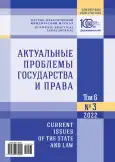Issues of the theory of international cooperation in the field of security within the framework of BRICS
- Authors: ASADOV B.R.1, GAVRILENKO V.A.1,2, NEMCHENKO S.B.1
-
Affiliations:
- Saint-Petersburg University State Fire Service of the Ministry of the Russian Federation for Civil Defense, Emergencies and Elimination of Consequences of Natural Disasters named after the Hero of the Russian Federation, Army General E.N. Zinichev
- Sapienza University of Rome
- Issue: Vol 6, No 3 (2022)
- Pages: 437-449
- Section: Национальная безопасность
- URL: https://journal-vniispk.ru/2587-9340/article/view/303844
- ID: 303844
Cite item
Abstract
We analyze the problems of finding the most effective collective security mechanisms at various levels. The relevance of this topic is due to the priority of the tasks of modern states in the field of maintaining security. Issues of the theory of legal regulation of interstate relations are of particular relevance. The growing tension and other destructive tendencies in the modern world create many prerequisites for a possible transition to another level of international cooperation in the field of security. The development of new alliances and attempts to expand the role of existing interstate mechanisms actualize the issues of improving the formats of international cooperation in this area. BRICS, one of the key formats of multilateral cooperation aimed at creating their own model of interaction, continues to offer participants the opportunity to demonstrate not only an important geo-economic and humanitarian role, but also geopolitical significance in the world. We conclude that the growing influence of many factors of the new geopolitical reality determines the renewal of existing security strategies and the formation of new BRICS priorities. The need to expand the role of BRICS in this area, in which the influence of certain internal factors and especially the changing conjuncture of international relations on this process is still important, requires the use of the most flexible mechanisms and channels of cooperation aimed at both developing BRICS soft security mechanisms and on the further improvement of their own system of collective security as a whole. The above study and conclusions contribute to the development of the science of the theory of state and law in the field of regulation of international relations.
About the authors
Babek R. ASADOV
Saint-Petersburg University State Fire Service of the Ministry of the Russian Federation for Civil Defense, Emergencies and Elimination of Consequences of Natural Disasters named after the Hero of the Russian Federation, Army General E.N. Zinichev
Author for correspondence.
Email: asadovspb@mail.ru
ORCID iD: 0000-0003-0956-6388
Candidate of Politics, Associate Professor, Associate Professor of Theory and History of State and Law Department
Russian Federation, 149 Moskovskiy Ave., St. Petersburg 196105, Russian FederationVladimir A. GAVRILENKO
Saint-Petersburg University State Fire Service of the Ministry of the Russian Federation for Civil Defense, Emergencies and Elimination of Consequences of Natural Disasters named after the Hero of the Russian Federation, Army General E.N. Zinichev; Sapienza University of Rome
Email: gv22@mail.ru
ORCID iD: 0000-0002-7357-3526
Candidate of Law, Associate Professor, Associate Professor of Theory and History of State and Law Department; Doctoral Candidate of Law Department
Russian Federation, 149 Moskovskiy Ave., St. Petersburg 196105, Russian Federation; 5 Aldo Moro Sq, Rome 00185, ItalyStanislav B. NEMCHENKO
Saint-Petersburg University State Fire Service of the Ministry of the Russian Federation for Civil Defense, Emergencies and Elimination of Consequences of Natural Disasters named after the Hero of the Russian Federation, Army General E.N. Zinichev
Email: nemchenko-st@mail.ru
ORCID iD: 0000-0001-9785-6419
Candidate of Law, Associate Professor, Associate Professor of Theory and History of State and Law Department
Russian Federation, 149 Moskovskiy Ave., St. Petersburg 196105, Russian FederationReferences
- Abdenur A. Mogut li strany BRIKS sotrudnichat’ v voprosakh mezhdunarodnoy bezopasnosti? [Can the BRICS countries cooperate on international security issues?]. Vestnik mezhdunarodnykh organizatsiy – International Organisations Research Journal, 2017, vol. 12, no. 3, pp. 73-93. (In Russian).
- Vinokurov V.A. Bezopasnost’ gosudarstva: konstitutsionno-pravovoy aspekt [State security: constitutional and legal aspect]. Konstitutsionnoye i munitsipal’noye pravo – Constitutional and Municipal Law, 2017, no. 12, pp. 33-36. (In Russian).
- Nemova N.Y., Grigonis V.P. Vliyaniye konstitutsionnykh norm na vzaimootnosheniya organov gosudarstvennoy vlasti i mestnogo samoupravleniya v Rossiyskoy Federatsii [Influence of constitutional standards on the relationship of state authorities and local government in the Russian Federation]. Pravo. Bezopasnost’. Chrezvychaynyye situatsii – Law. Safety. Emergency Situations, 2021, no. 3 (52), pp. 52-58. (In Russian).
- Tyler M.C., Thomas M. BRICS and Mortar(s): Breaking or Building the Global System? The Rise of the BRICS in the Global Political Economy: Changing Paradigms? Cheltenham, Edward Elgar Publishing, 2014, pp. 253-267. doi: 10.4337/9781782545477.00022
- Buzan B., Waver O. Regions and Powers. The Structure of International Security. Cambridge, Cambridge University Press, 2003, 592 p.
- Asadov B.R. Global’noye zdorov’ye – faktor bezopasnosti v kontekste partnerstva VOZ i aktorov mezhdunarodnoy gumanitarnoy deyatel’nosti [Global health – factor of security in the context of the partnership the world health organization and actors in international humanitarian action]. Pravo. Bezopasnost’. Chrezvychaynyye situatsii – Law. Safety. Emergency Situations, 2019, no. 2 (43), pp. 43-53. (In Russian).
- Shelepov A.V. BRIKS i mezhdunarodnyye instituty: modeli vzaimodeystviya v protsesse osushchestvleniya mnogostoronnego upravleniya [BRICS and International Institutions: models of interaction in the process of multilateral governance]. Vestnik mezhdunarodnykh organizatsiy: obrazovaniye, nauka, novaya ekonomika – International Organisations Research Journal, 2015, vol. 10, no. 4, pp. 7-28. doi: 10.17323/1996-7845-2015-04-07. (In Russian).
- Eremina N.V. BRIKS v reshenii zadach bezopasnosti: osnovnyye aspekty [BRICS and security issues: common aspects]. Azimut nauchnykh issledovaniy: ekonomika i upravleniye – Azimuth of Scientific Research: Economics and Administration, 2017, vol. 6, no. 3 (20), pp. 393-395. (In Russian).
Supplementary files








